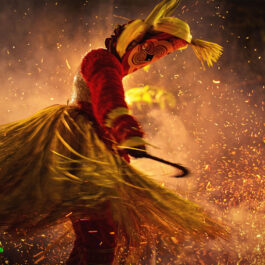Gift-giving can be a particularly difficult undertaking. It takes knowing the gift recipient well enough to have an idea of what they would like, and also choosing between the thousands and thousands of options out there. And sometimes it involves giving the chosen hero just the right magical implement so they can proceed to save the world. From enchanted artefacts to lovingly handmade crafts and sweet treats with a terrible twist, we look at the most iconic gifts from some of the best-loved books in literature.
The Cloak of Invisibility from Harry Potter
Simply put, Harry Potter has been the biggest literary phenomenon since The Lord of the Rings. And though many have tried, no other book series in recent memory has been able to capture the hearts (and wallets!) of readers quite as well – and few other stories are as chock-full of magical toys, tools and inventions as Rowling’s tale of The Boy Who Lived. From flying broomsticks to enchanted mirrors and curious treats, the tales have no shortage of enchanted objects we all wish were real.
La crème de la crème? That spot goes to Harry’s trusty invisibility cloak, introduced in the first book of the series, Harry Potter and the Philosopher’s Stone, when Hogwarts Headmaster Albus Dumbledore gifts it (back) to him at Christmas, and which aids and accompanies him throughout all seven books through pranks, mischief and all sorts of dangerous and momentous adventures. If the 2016 play Harry Potter and the Cursed Child is to be taken into consideration, Harry eventually passes it on to his children.
Willy Wonka’s Chocolate from Charlie and the Chocolate Factory
Charlie Bucket and his family are very poor. So poor that his four grandparents sleep huddled together in the same bed. So poor that the family subsists on just bread, potatoes and cabbage. So poor that Charlie gets only one delicious Wonka chocolate bar for his birthday each year. But that’s what makes the treat so special: Charlie’s parents save what precious little money they have in order to gift their son that one special thing on that one very special day. And though his birthday chocolate bar would not be the one containing the life-changing coveted Golden Ticket that grants entry to Willy Wonka’s mysterious chocolate factory, it nevertheless symbolises the authentic love, generosity and warm-heartedness of Charlie’s family – values which contrast greatly to those of the other children who join the factory tour, and whose visits end in circumstances befitting their selfish, greedy characters.
Riptide from Percy Jackson
Can you imagine if your favourite pen suddenly turned into a sword? Crazy, right? Not too crazy for author of the Percy Jackson novel series, Rick Riordan, to dream up. Riptide is first given to Percy by Chiron, a hero trainer disguised as one of Percy’s teachers, so that he can defeat Alecto, a Fury (vengeful spirit of the underworld) who is also in disguise as a teacher. Chiron then briefly takes it back, but returns it to Percy right before he leaves for an important quest. That’s when he finds out that the sword has “a long and tragic past”, and that it can never be lost – it will always return to its owner. The sword/pen accompanies Percy throughout many battles and adventures. Versatile, practical and trustworthy – not to mention a beautiful if heavy-handed metaphor for the power of the written word – it’s the perfect gift for any intrepid half-blood.
Icarus’ Wings from The Metamorphoses
Have you ever been warned not to “fly too close to the sun”? The phrase derives from ancient Greek mythology, specifically the tragic tale of Daedalus and his son Icarus, who (for a series of complicated reasons we won’t try to explain here) attempts to flee the island of Crete with two sets of wings that Daedalus, being a great inventor, crafted himself out of feathers and wax. Before departing, Deadalus warns his son about flying too low, for fear of the sea wetting the feathers and making them heavy, or too high, for the heat from the sun could melt the wax that held the wings together. Yeah, guess what Icarus did. An incredible gift that, while ultimately squandered, warns the rest of us against the foibles of complacency and hubris.
The Starks’ Direwolves from A Song of Ice and Fire
Highly intelligent and abnormally large (the size of a small horse when fully grown), direwolves were believed to be extinct in the kingdom of Westeros – that is until Eddard Stark and his sons find a dead direwolf and her six pups. The discovery is especially meaningful for the Stark family, as the direwolf is the emblematic sigil of House Stark, and so the pups are taken in by the Stark children to be raised with permission from their father. The direwolves eventually grow into fierce beasts that accompany and protect each of the children through the trials and tribulations they experience in this turbulent time in Westeros history. Could there be a better present than such a loyal companion?
Daisy Buchanan’s Pearls from The Great Gatsby
Daisy Buchanan is a controversial character when it comes to readers’ affections. She’s beautiful and interesting, but fickle and materialistic. She also betrays Gatsby, so it’s understandable for readers to prickle at the mention of her. Case in point: Before their wedding, Daisy’s fabulously wealthy but unfaithful fiancé, Tom Buchanan, gifts her a stunning pearl necklace worth $350,000 ($4.7 million in today’s money, according to Forbes), and Gatsby sends her a letter – causing her to momentarily reject the pearls and almost call off the wedding. Ultimately, however, she goes through with the wedding, choosing wealth (symbolised by the necklace) over love (embodied by the letter). A shallow choice, for sure, and one that will set in motion the story’s tragic chain of events.
The White Witch’s Turkish Delight from The Chronicles of Narnia
Some gifts come with strings attached, a fact which Edmund Pevensie in The Lion, the Witch and the Wardrobe finds out too late. When he first stumbles through the wardrobe and into Narnia, Edmund encounters the evil White Witch who uses Turkish delights – a traditional confection usually made with rosewater or lemon and dusted with heaps of powdered sugar – as a way of tricking him into following her demands. Like all of her food, it is enchanted to make the person who eats it want more and more, and Edmund ends up promising to bring his siblings to her in exchange for more of the sweet treats. If you’re curious as to what Turkish delight tastes like, and not willing to sell your family out to an evil witch to get it, here’s an easy to follow recipe.
Minny’s Pie from The Help
We should start by saying this isn’t exactly a good gift, and we definitely wouldn’t advise you to follow Minny’s recipe, but it’s certainly a key moment – as triumphant as it is gross.
Famous for her mouth-watering cuisine, bold and strong Minny Jackson is a housekeeper who – despite having an outspoken nature that gets her into trouble with her employers – is rather sought-after for her delicious cooking. Her star recipe? Chocolate pie. Here’s what goes down: Miss Hilly, Minny’s former employer, trash-talks her, making sure Minny won’t be able to find a new job. Under the pretence of reconciliation, Minny asks Miss Hilly to meet up – and she makes sure to bring a gift: one of her delicious pies, except this one’s extra special, made with a secret ingredient. Minny then watches Hilly eat two slices and praise her pie before telling Hilly the truth. You’ve probably already guessed the secret ingredient. Revenge was sweet for Minny and the reader, but not so much for Miss Hilly.
Beth’s Piano from Little Women
Before there was “what’s your Hogwarts house?” there was “which of the March sisters are you?” Let’s face it, most of us wish we were Jo but are actually more of an Amy. What we can all agree on, however, is that Beth is the sweetest of all the sisters, and her (SPOILER ALERT) untimely death is one of the most heartbreaking events in literature. What adds a bit of comfort is the fact that she received so much love and affection from all who knew her – including Mr. Laurence, her neighbor who generously gifts her his late granddaughter’s piano, which had remained untouched since his death until Beth began playing it. It’s all right, we’re tearing up just thinking about it, too.
Max’s Handmade Book from The Book Thief
Sometimes the best gifts are those people make with their own hands. After all, is there a more heartwarming show of affection than when someone goes out of their way to make you feel special using any means available to them, however limited? That’s what happens in The Book Thief when Max, the young Jewish man hiding in the basement of Liesel Meminger’s foster family’s house, makes her a homemade book titled The Standover Man. The book expresses his affection for her and appreciation of their friendship, with his own drawings and words hand-written over pages ripped from Mein Kampf. A book within a book – notably made by destroying a monstrous book – it is without a doubt one of the most heartfelt, meaningful gifts ever given in literature.














Sorry, the comment form is closed at this time.